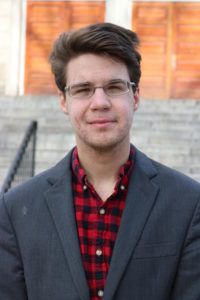By Ryan Di Corpo
 As nostalgia is normally one of my dominant emotions, I would like to take this opportunity, as is custom, to reflect on my time writing for The Fordham Ram.
As nostalgia is normally one of my dominant emotions, I would like to take this opportunity, as is custom, to reflect on my time writing for The Fordham Ram.
My time spent with the The Ram has represented my first legitimate foray into the world of journalism.
I wrote for my high school newspaper for what seemed like 15 seconds, during which I submitted my only article that was never published because it was sent in late.
I approached the opportunity to write for The Ram with a greater seriousness.
One of my first articles for the paper was a half-obituary, half-personal reflection on the life and legacy of Rev. Daniel J. Berrigan, S.J. Fr. Berrigan, whom I befriended in his final five months of life.
He lived at Murray-Weigel Hall Jesuit Infirmary and was a Jesuit peace activist, award-winning poet and Nobel Peace Prize-nominee.
Fr. Berrigan, who preached that nonviolence was central to the teachings of Christ and necessary to living as a Christian, exercised a profound, transformative impact on my faith life.
Writing about him for The Ram provided me an opportunity not only to sort out my thoughts, but also to inform the University community about his contributions to American spiritual thought and cultural life. Following this article, I began writing for the newspaper with increased frequency during the last semester of my sophomore year.
I focused mainly on film reviews, as I am a film major. However, I have been privileged to write for The Ram on a variety of interesting events.
One example occurred in January 2018, when I attended a talk by Dr. Henry Kissinger at 92Y. Kissinger, who served as U.S. Secretary of State from 1973 to 1977, spoke with Rabbi Peter J. Rubinstein on various topics.
However, there was absolutely no attention paid to Kissinger’s role in the Vietnam War and in several other controversial conflicts during his many decades in public service, if you can call it that.
After the talk, I spoke with Peter J. Rubinstein who, while kind enough to give me the time of day, was defensive of his decision to gloss-over most of Kissinger’s storied past.
Brief as my interaction with Rabbi Rubinstein was, it was my first experience with a more critical form of journalism, one which asks hard questions and searches for sufficient answers.
Another interesting aspect of my involvement with The Ram has been the opportunity to interview a variety of persons, such as Academy Award-winning documentarian Frederick Wiseman and Tony Award-winning actor Leslie Odom, Jr.
However, my favorite interview thus far has been with Rev. Raymond A. Schroth, S.J. Fr. Schroth, who began teaching journalism at Fordham University in 1969 and served as an editor for America and Commonweal.
As a respected author, Fr. Schroth has written books on CBS correspondent Eric Sevareid, congressman and Jesuit priest Robert Drinan and the history of Fordham.
The interview with Fr. Schroth was most impactful to me due to his stalwart dedication to issues of social justice and his advocacy for students, in spite of opposition.
Fr. Schroth supported students who led an on-campus protest against the Vietnam War, and found himself running into a burning Campus Center in 1970.
His definition of the purpose of journalism is among the best I know of.
According to Fr. Schroth, journalism is “perhaps the greatest civic educational […] tool to spread democracy and give voice to the voiceless.”
In a political era, not unlike that of fifty years ago, where journalism is frequently assailed by some as deleterious to the interests of the American public, the job of journalists – and the need for near infallible accuracy – has become of increased importance.
Furthermore, in a political era which also attempts to keep quiet the voices of those who ought to be heard, journalism truly assumes the mantle of being “a voice for the voiceless.”
I make no claim that my journalism thus far has at all accomplished this; it has not.
There is room for both improvement and much-needed experience.
However, my experience in writing for The Fordham Ram has both fostered my commitment to journalism and surrounded me with writers stronger than myself.
Such is the mark of a good publication, one where its writers and its reporting are bettered by its sense of community.




































































































































































































